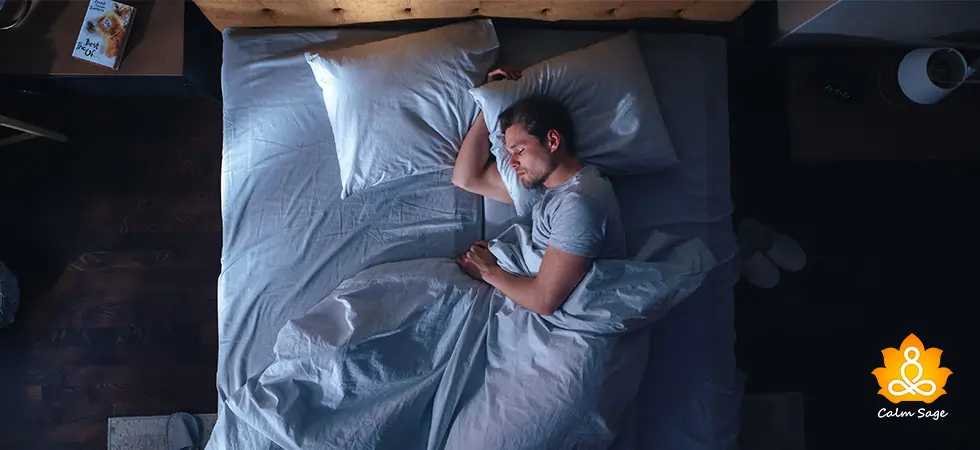Do You Talk In Sleep? What Can Be The Reason?

Sleep talking is a condition where an individual talks, blabbers or makes some words-like sounds in sleep. It is very common in children and there is nothing to worry about. But when it happens to adults, it might be a sign of some underlying condition.
Sleeping talking was initially known as somniloquy (the act of talking during REM sleep). When someone talks in their sleep their speech is not always clear. They usually blabber something meaningless or say half-sentences.
Strangely enough, the person who is sleeping has no memory of them doing so or what they were trying to say during sleep. Sleep talking is not considered a sleep disorder but it is a prominent symptom of various disorders like parasomnia, sleep apnea, etc.
Let’s understand sleep talking better…
Why Do People Sleep Talk?

We cannot say for certain why people sleep talk, unfortunately. Whenever we hear someone talk in sleep, we automatically assume their speech to be related to their dream. Sometimes we assume it to be a reaction to what’s happening in their dreams. Although these can be the reason for sleep talking but it’s not the case with people who suffer sleep talking caused by some underlying condition.
If you or someone you know talks in sleep once in a blue moon, there’s nothing to worry about. If you start talking in sleep very frequently, maybe there is something your mind and body are trying to tell you.
Since dreams are said to be an interpretation of our subconscious and the unconscious mind, our sleep talking can uncover some core beliefs and fears. Other than dreams, things like stress or alcohol can also contribute to sleep talking in some cases.
Symptoms Of Sleep Talking
Sleep talking does not have a series of symptoms. Sleep talking is very easily noticeable. The one thing you might not notice about sleep talking is that the person you indulge in talking to in sleep can’t recall anything they said. They might not even be aware of their tendency to talk in sleep.
There is one symptom of sleep talking and that is talking during sleep. When sleep talkers talk it will not always be very clear. Sometimes they might just give a long speech and some other times they might just mumble some words.
In some cases of extreme stress and anxiety, sleep talkers might just articulate the things that were going on in their minds during stressful situations earlier that day. So, there is mumbling, response, speeches, and mourning noise that sleep talkers can indulge in.
What Causes Sleep-Talking In Adults?

There are no exact causes of sleep talking. It can happen because of various reasons but we do not have anything to pinpoint as of now to state the cause of sleep talking. However, there is a dedicated team who is working on sleep-related issues and has come up with some risk factors.
These risk factors can make an adult susceptible to sleep talking. Let’s have a look;
- Alcohol and drug use
- Daytime fatigue
- Fever or a general illness
- Medications
- Sleep deprivation
- Stress
Sleep talking is found as a symptom of mental health conditions like;
- Dementia
- Post-traumatic stress disorder (PTSD)
- Seizures
- Sleep apnea
- Depression
How To Prevent Talking In Sleep (Sleep Talking Treatment)
Sleep talking does not cause much hindrance in an individual’s daily functioning, therefore. Even if it goes untreated it won’t cause much. However, sleep-talking is a symptom of various severe mental health conditions, so treating these conditions can automatically resolve your sleep-talking issue.
Mental health professionals usually go for psychotherapy or some medication to relieve the patient of symptoms of stress, anxiety, sleep disorder, depression, etc. which automatically caters to your sleep talking.
If you only wish to cater to your sleep-talking issue, you can try some self-help and coping strategies to reduce sleep-talking. Here’s what you can do;
- Have a proper sleep routine
- Try to get at least 7-9 hours of sleep a day
- Always have 30 to 60 minutes of quiet & screen-free time
- Practice stress management strategies
- Reduce alcohol consumption
- Avoid taking caffeine in the evening and later
- Exercise regularly
- Make your bedroom quiet, clean, and as comfortable as possible
- Keep the lighting and temperature in control in your bedroom
That’s All Folks!
I hope you found this blog about sleep talking helpful, interesting, and informative. Do share this blog with your friends and family so that they don’t panic upon encountering sleep talking.
Thanks for reading.
Take care and sleep tight!




















